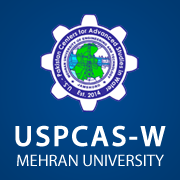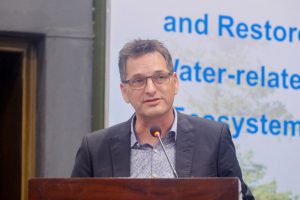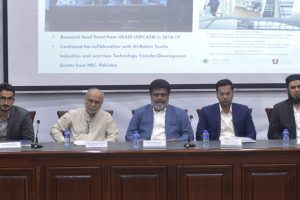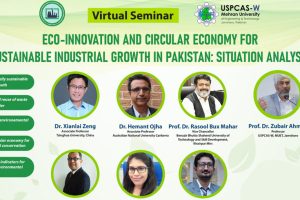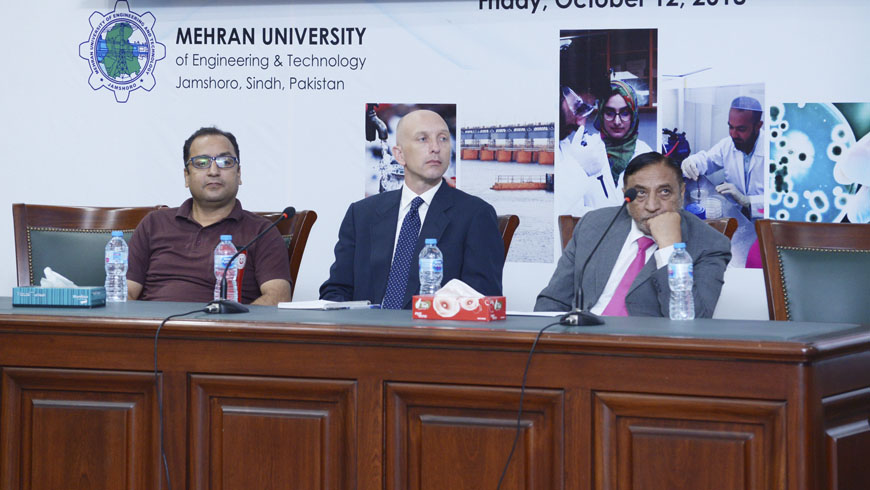
Seminar on Identification of Antibiotic Resistant Bacteria in the different Source Waters of Hyderabad City and its Surroundings
A project seminar on Identification of Antibiotic Resistant Bacteria in the different Source Waters of Hyderabad City and its Surroundings held at U.S.-Pakistan Center for Advanced Studies in Water (USPCAS-W), Mehran University of Engineering and Technology (MUET) Jamshoro on Friday. Dr. RasoolBux Mahar, Deputy Director of USPCAS-W MUET and the principal investigator of the study, said that Antibiotic Resistant Bacteria (ARB) is a global public issue today. He said that if the problem of antibiotic resistance shall not be tackled properly then 10 million deaths and loss of 66 trillion pounds will occur and Asian countries will be mostly affected by this issue. “Consumption of antibiotics worldwide is around 100,000 to 200,000 tons per year”, he added. Dr. Mahar said that the presence of antibiotic resistant bacteria in different water sources of Hyderabad lessen the efficacy of antibiotic medicines prescribed by the doctors to the patients. He said through the study, the presence of ARB is found in the groundwater, surface water,and wastewater in Hyderabad and its surroundings due to industrial wastes, agricultural runoff, and the waste of humans and animals.
While sharing the presentation in the seminar, Dr. Mahar shared the types of antibiotic resistance mechanisms, occurrence, and sources of ARB. He also shared the illustrated and detailed disinfection process of ARB including the chlorine, ultraviolet and silver nanoparticles. “Antibiotic resistance offered by seven different types of bacteria was checked by using Disc diffusion method and also the health impacts of the bacteria were also identified in this research,” Dr. Mahar explained.In conclusion, he shared that presence of bacteria was observed in drinking water samples and showed a significant amount of Heterotrophic Plate Count (HPC) in which the most of the organisms isolated from the samples were, Pseudomonas, Shigella, Vibrio,and E-coli. “Bacterial isolates identified in the study findings have a potential threat to the people living in Hyderabad,” he added.
He elaborates that water distributes network of Hyderabad have some technical flaws which not only deteriorating the water quality of the city but are also providing conditions for the flourishing of bacterial growth.Dr. Zulfiqar Ali Mirani, senior scientific officer at Pakistan Council of Scientific and Industrial Research (PCSIR) Karachi office and Co-Principal Investigator while sharing the second technical part of the study said that in total of 501 isolates of Escherichia coli, Pseudomonas aeruginosa, Staphylococcus aureus, Klebsiella pneumoniae, Proteus sp., Shigella sp., Vibrio sp. and enterococci that were identified on the basis of biochemical, morphological and cultural characteristics were screened against medically common antibiotics. He said that microbiological analysis showed that the majority of water samples are not fit for human consumption. Referring to the World Health Organization standards, Dr. Mirani said that water used for drinking, cocking, and washing must be free of coliform and fecal coliform bacteria.
He further said that through this study 70% of water supplied by the municipal and sanitation services authority of Hyderabad and 87% of river/ canal and groundwater samples were declared not fit for cocking, washing and drinking purposes. “Majority of Reverse osmosis (RO) water samples were declared not fit due to high bacterial load,” he added. While sharing the recommendation, Dr. Mahar said that community, government and relevant authorities might be sensitized through the awareness campaigns regarding the antibiotic resistant bacteria as the people should avoid self-medication and excessive use of antibiotics.
He suggested that hospital waste should be disposed of properly and waste water should be treated properly before its disposal into water bodies because waste water contains a greater amount of antibiotics. He also recommended that the researchers may develop innovative techniques, to deal with antibiotic resistant bacteria more efficiently and the complete disinfection of antibiotic resistant bacteria will only be possible, when there will be a proper disinfection system in water treatments plants and flaws in the water distribution network will be eliminated or improved.Dr. Hussain BuxKolachi, a professor at ISRA University Hyderabad, speaking regarding typhoid research in the seminar said that antibiotic resistant strains of S Typhi are increasing rapidly included multi resistant strains and those less sensitive to quinolones such as ciprofloxacin we are running out of the treatment options making vaccination against typhoid even more imperative. “Typhoid infection prevention is more crucial than treatment,” he added. According to WHO, he said that there were 16 million to 33 million cases and among them,500,000 to 600,000 deaths occur due to typhoid fever annually.
He said that type bar TVC vaccine one dose above six month children is very much necessary. In closing remarks, Dr. Jeff Ullman, from University of Utah, USA and the technical adviser to USPCAS-W MUET said that such studies revealeda new dimension of research globally and paved the way for the glothe bal network to tackle these issues. He said the existing environment and behavior of people could be changed according to the research based findings to live the health life. Before the technical session, Dr. RasoolBuxMahr welcomed the participants of the seminar and thanked U.S. Agency for International Development (USAID) for funding the project study on Identification of Antibiotic Resistant Bacteria in the different Source Waters of Hyderabad City and its Surroundings and also establishing the MUET Water Center – USPCAS-W.
Vice Chancellor MUET Dr. Mohammad Aslam Uqaili, MUET Pro-Vice Chancellor Dr. Tauha Hussain Ali, officials from Water Sanitation Authority (Wasa) Hyderabad, Public Health Engineering, Government of Sindh, civil society activists, academia, and students attended the seminar and also participated in the question and answer sessions. The main purpose of the seminar was to bring government, policymakers, and relevant stakeholders together to share, deliberate, and brainstorming about the Antibiotic Resistant Bacteria in the different Source Waters of Hyderabad City and its Surroundings and to suggest the protective measures.

